The bell also tolls for you

The Pahela Baishakh festivities bring out the best in us Bangladeshis. Apart from its creative and cultural aspects, Pahela Baishakh serves as a unifying force, giving us a sense of comfort and security in our Bengali identity. The simple joys of sharing a machh/bhat meal with close friends and singing songs of "new beginnings" keep us connected to our roots.
As I reminisce about the Pahela Baishakh celebrations of my youth, I am disturbed at the thought of how much the world has changed. We are virtually living on the edge - constantly irked by some negative occurrence that jolts our conscience and dilutes our small moments of undiluted happiness.
The past few weeks have been especially traumatic. At the end of March, US air strikes, intended for ISIS fighters in Mosul, killed more than 200 civilians. In early April came the chemical attack (reportedly by the Assad regime) in northwestern Syria, killing at least 70 people, including children. The horrifying images were unbearable to watch and generated shock and outrage all over the world. Within 72 hours, President Trump retaliated by bombing the airfield from which the chemical gas attack was launched. Although aimed at censuring Assad, this only added to the number of casualties. The Syrian dictator still remains defiant. While world leaders continue to debate and analyse these actions, ordinary people like me are deeply alarmed and shocked at the havoc wreaked on the lives of innocent people.
In the midst of the massive global unrest, an incident on a United Airlines flight last week touched a raw nerve. A video clip shared on social media showed security officers at a Chicago airport forcefully dragging a passenger along the aisle of an aircraft in an attempt to offload him. The Asian-American man was asked to get off to accommodate crew members on an overbooked flight. When he refused, saying he was a doctor and had patients waiting for him, police officers used physical force to remove him. In the video clip, the injured man was seen running back to his seat, blood flowing down his lips, muttering, "I want to go home, I want to go home".
The victim is still in a hospital being treated for injuries and trauma. The video has triggered an outrage, and people in the social media are talking about legal recourse, financial compensation and an unequivocal apology from United, which the company CEO was forced to give.
But what has been nagging my conscience is the fact that few have raised the issue of compassion and empathy. Surprisingly, people inside the aircraft did not protest when they watched a fellow passenger being maltreated by the authorities. No one even offered to help the injured man when he came back hurt and traumatised. There is little we can do to voice our frustration against Assad's brutal attacks on his own citizens. But when an innocent human being is physically abused and humiliated in our presence, should we not show our compassion for him in more proactive ways than just posting a video clip on social media? Why didn't someone stand up and say "let's all boycott this flight"? If nothing else, this would have sent a strong message to the airline's management.
Regrettably, we are becoming increasingly selfish and callous. Is it because we now communicate through the internet rather than direct interaction and have lost the human touch? How many of us spend quality time with an elderly family member unless there is a pressing reason? How often do we visit our ailing relatives? Or a friend who is going through depression and needs someone to hold her hand? It appears that compassion and kindness have become negotiable commodities and we give them only when we expect something in return.
Many would say this kind of compassion seems mushy or is a display of moral one-upmanship. They also fear that empathy and compassion may lead to unnecessary emotional burnout and ultimately take a heavy psychological toll. But then, should we accept what we know to be wrong because we believe it doesn't affect us directly?
The fact is, if it affects our world, it also affects each one of us. Try as we might, we cannot escape the angst caused by the cries of hungry children outside our doors or the threat of random terror attacks in a volatile and unbalanced society. No matter how insulated we believe we are, our fate is closely linked to those around us.
The beginning of a new year is not just a time for celebration; it's also a time for reflection. With the advent of the Bengali New Year, it may be pertinent to remind ourselves that "no man is an island," we are all a part of the "whole". Let us not ask "for whom the bell tolls", for it also tolls for you and me.
The writer is a renowned Rabindra Sangeet exponent and a former employee of the World Bank.


 For all latest news, follow The Daily Star's Google News channel.
For all latest news, follow The Daily Star's Google News channel. 



Comments